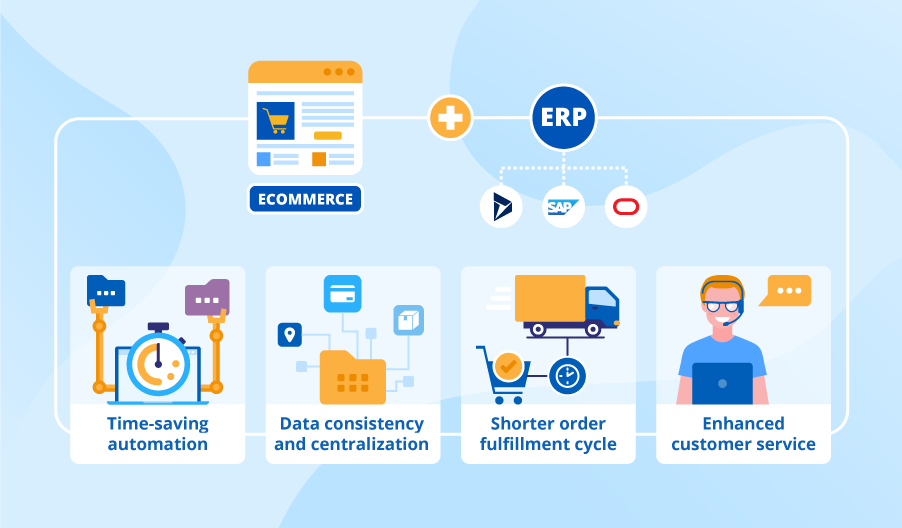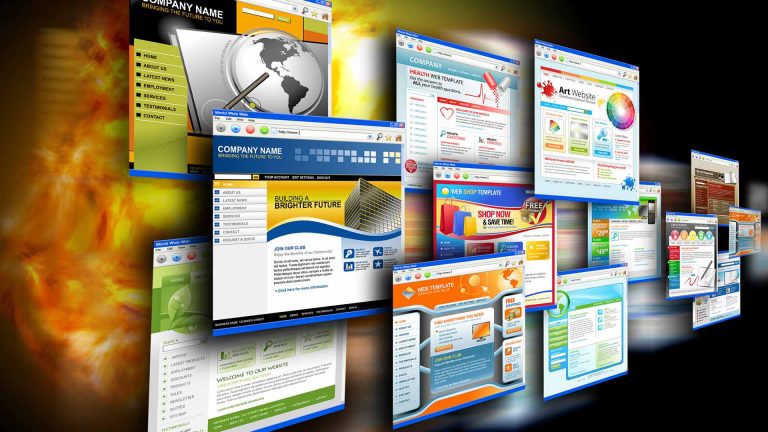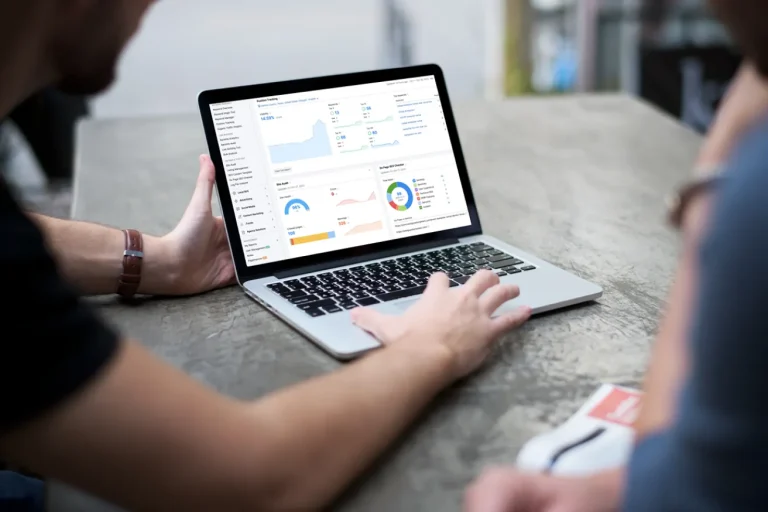Ecommerce erp: Definition, Benefits and complete Guides to ERP Integration
E-commerce with ERP (E-commerce integration) is the coordination between a company’s e-commerce website and its back-end accounting and inventory (ERP) system. A good integration allows a bi-directional flow of information between the two systems, so data only needs to be entered into the system once.
 Let’s explore things we need to know about eCommerce ERP
Let’s explore things we need to know about eCommerce ERP
What is E-commerce ERP?
Even if you’re a retailer who sells direct-to-consumer (D2C) eCommerce, a business-to-business (B2B), or business-to-consumer (B2C), you have one target: make your business grow. However, as your business grows leads to the complexity of your operations. You may use to be able to handle accounting with QuickBooks, customer relationship management (CRM) with Salesforce, and inventory management with SkuVault, but now You need more than these separate, siloed solutions can provide.
It’s a seamless integration between your e-commerce system and a modern cloud-based ERP solution by entering your eCommerce ERP (Enterprise Resource Planning). Together, they extend the breadth and depth of your business, connecting processes and procedures for consistent and future-proofed operations.
If you want your business to get the best eCommerce services, welcome to Onext Digital. We are a software company that specializes in offering full services, specializing in eCommerce services and others. Let’s learn more about it.
ERP and E-commerce Integration Explained:
An ERP system is business software that performs critical business tasks, It typically synchronizes or integrates various sources of business data.
Many enterprises use ERP software to manage financial information, wages, and costs, and to reconcile sales data. Besides, it also gives the result in even including reports, forecasts, or budgets.
Others may need an ERP tool to connect to their logistics partners. If an e-commerce businesses need to closely monitor inventory levels or get real-time updates from warehouse management solutions, ERP is useful. In summary, ERP and e-commerce integration means getting as much business data as possible into your ERP to make it more effective.
ERP platforms are becoming more popular in various industries, and recent research suggests that the ERP market will be worth at least $49.2 billion by 2027. Let’s consider the following factors:
- The desire for Lean Business Processes
- Improving operational efficiency to address rising costs elsewhere
- Further digital transformation and adoption of new technologies
- Increased business engagement via mobile devices and apps
- Increase in business volume and business types utilizing PaaS and SaaS
Not only do major corporations rely on digital platforms to manage their business data but also do even small and medium businesses use them to do this. The advent of cloud-based Software as a Service (SaaS) available on many budgets brings many choices for organizations. They can take advantage of ERP software to develop themselves. ERP integrations and workflows are built around business needs, industries, and the need for fully integrated and complete data.

The benefits of eCommerce ERP
You’ll get many advantages thanks to selecting an ERP solution. You’ll get a better online experience, pricing management, access to valuable data, increased productivity, and process visibility.
1. A better online experience.
The more Increased customer engagement, the better the customer’s online experience. For example, an ERP solution can manage fulfillment and notify customers when the manufacturing process begins, when products are packed, and when items are shipped.
2. Controlling Pricing.
Price management is a function that manages product prices in ERP, similar to product information management. You can adapt your responses to different customers. For example, in B2B, if the first customer negotiates the price and the second new customer does not, the appropriate information can be sent to the e-commerce platform accordingly. You can also set individual customer access rights to products (for example, customer 1 has 100% licenses and customer 2 has 70% licenses).
3. Access to valuable data.
When customers engage with you, the information has been stored on the eCommerce site. You will access valuable data being pulled in real-time from this site. You can use this data for actionable reporting and forecasting.
4. Process visibility.
You can create reports showing the status of your business, sales, returns, and inventory. You can also see who is doing what and assess the profitability of your business.
5. Increased productivity
When every employee uses the ERP system as the centralized system of record, it leads to increased productivity results. Task automation. For example, automatically tracking inventory deductions during fulfillment or generating automated processes for purchase requirements further increases productivity.
6. Reduce the need for manual data entry
Another reason to invest in ERP and e-commerce integration is that it greatly reduces the need to manually enter information. Auto Filling data such as customer name and address data is more than just a time saver. Reduce the risk of human error such as misspelled names, wrong addresses, and wrong email addresses.
A customer who finds their name misspelled on their invoice may not only be upset but may enter a contest instead the need to fix the problem and replace the missing order can reduce customer
Important Features in eCommerce ERP
Ecommerce ERP providers deliver a wide variety of features. However, some features are more important to e-commerce companies than others in an ERP solution. Here are some of the features that are particularly beneficial when it comes to eCommerce ERP tools.
CRM
Becoming a successful e-commerce business requires a standardized way to effectively manage leads, contacts, opportunities, and customer accounts, as well as the ability to know what is happening at each stage of the sales cycle. That means you need a seamlessly integrated CRM solution that allows all departments to access real-time, synchronized data from a single source.
You can easily reach out to your customers with special offers, discounts, promotions, and other offers by building a customer database within your integrated solution. These promotions are designed within the e-commerce platform. And the ERP system understands what is received and creates a record for later reporting. Besides, eCommerce integration with ERP creates an omnichannel commerce environment. Thanks to this system, you’ll have a good view of how your customers have interacted with you in the past and how they are interacting with you now.
Finance
It’s efficient financial data, making your software solutions have a good operation. Therefore, financial management and accounting tools are core components of ERP. Financial data is key to centralizing processes and developing efficient predictive models. This allows you to plan backorders and predict delivery dates. You can also use financial information to select vendors to work with and track outstanding customers.
Ultimately, financial management is an important part of any business’s ERP solution, and the lower the profit margin, the higher the profit potential. If your eCommerce business already uses accounting software, consider integrating it with better eCommerce ERP capabilities. This makes information more professional and insights more easily propagated across departments.
Inventory Management
Its inventory management capabilities are one of the most essential features of eCommerce integration with ERP. Sales volume and the number of products available are two aspects that separate the needs of an e-commerce business from those of a brick-and-mortar retailer through an online business. Therefore, it’s easy to make mistakes due to the high workload of e-commerce organizations.
One thing you should keep is that having real-time information provided by an ERP system is critical to the success of your e-commerce business.
Shipping/Distribution
E-commerce integration with ERP solutions is the most scientific and efficient method to control your shipping, distribution, and warehouse management needs.
ERP can make the distribution process become automated. These processes are multifaceted, including wave and batch picking, packaging, PO receiving, putting away, transferring, and physical counting. Warehouse workers can use phones and tablets to complete tasks, lot and serial number tracking eliminates errors, and EDI compliance is handled by his EDI software from a third party.
Product information management.
As you know, there are many ways to sell products to customers. That requires us to have a tool to manage product information. And ERP is the best tool you should have. This information may relate to suppliers, product pricing, custom pricing, or options related to the product. Having information in one place allows you to distribute that information to many places.
Conclusion
Ecommerce ERP is important for business, especially eCommerce business that is looking to higher growth fast. Above there are some useful pieces of information for you and also businesses. If you need any support or need more information, contact us. ONEXT DIGITAL-a software company is always ready to discuss and support you




